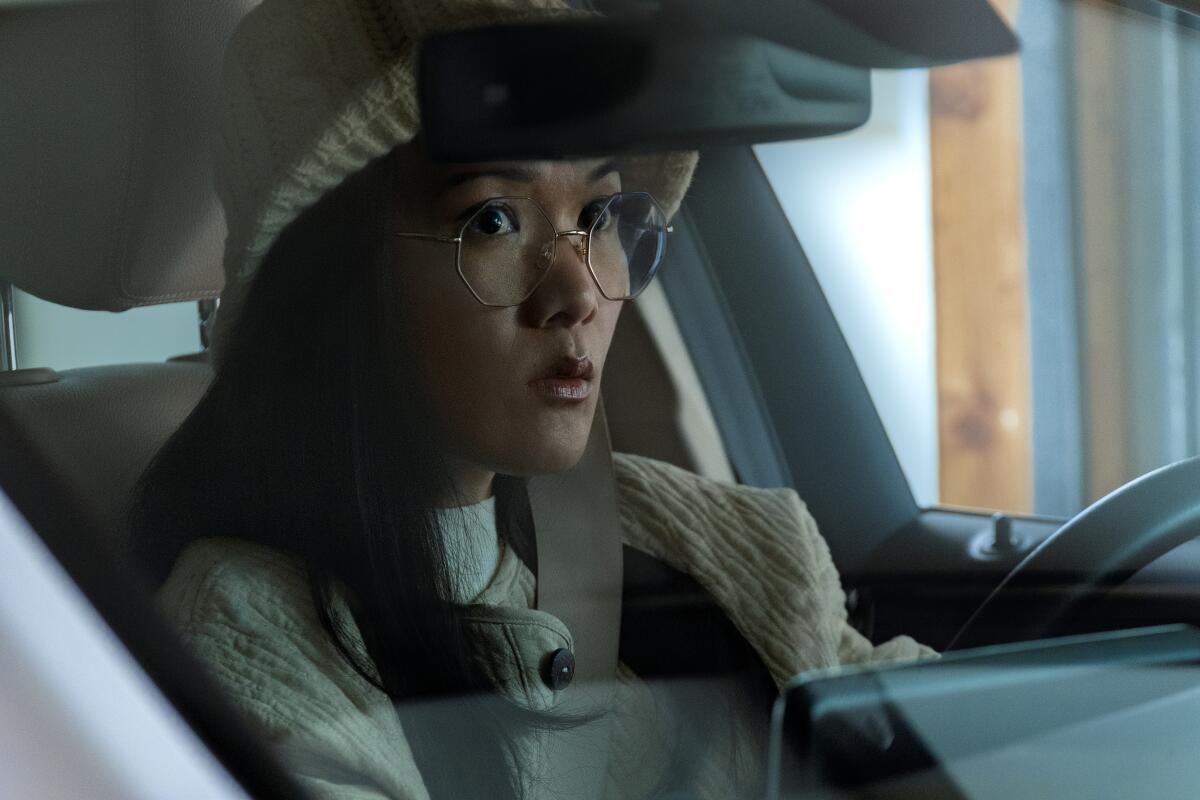Two new TV shows seem designed to test the viewer’s patience. And it pays off

- Share via
That characters don’t need to be likable is one of the lessons, tenets and some would say advances of 21st-century television. By many critical reckonings, the medium’s adulthood was signaled by the rise of the antihero — your Tony Soprano, your Don Draper, your Walter White — and the concomitant appearance of the anti-villain, the appealing bad guy: Boyd Crowder, say, or Al Swearengen. Such figures so dominated the premium TV landscape in the first decade of the 2000s as to become tiresome, a new cliché dressed as an innovation.
They were always men in the beginning, but more and more that role was taken on by women, in series like “Fleabag,” “Killing Eve,” “Ozark,” “Animal Kingdom,” “Crazy Ex-Girlfriend” and all over “Game of Thrones.” “Succession” features a woman nicknamed for what was originally criminal slang for a knife. These shows, if not necessarily better than their phallocentric predecessors, were more interesting just by virtue of allowing women agency, complexity and the right to be morally unappealing — a toxic femininity not unrelated to the classic femme fatale, but more confounding, harder to assess and therefore to dismiss. This did feel like progress.
Still, such characters can also try one’s patience, making a series difficult to watch, no matter how good it is. Two new quasi-comedies — “Am I Being Unreasonable?,” which premieres Tuesday on Hulu, and “Beef,” already running on Netflix — that focus on difficult women (alongside some difficult men) fit that bill. I have nothing negative to say about either show on any creative or technical level; indeed, there’s much to praise. They’re well-written, well-directed and very well performed. If they were less convincing, they’d be easier to dismiss, if no easier to experience.
Do I recommend them? I don’t not recommend them — they’re good.
Would I have watched them all the way through were I not writing about them for work? I’m not at all sure.
A therapist explains how Amy and Danny aren’t so different when it comes to their inner emotional lives.
Nic is the difficult person in “Am I Being Unreasonable?” — whose title would seem to imply the answer “yes” — starring and co-created by Daisy May Cooper (who co-created and starred in the British comedy “This Country,” on which “Welcome to Flatch” is based). She has a young son, Ollie (Lenny Rush), who looks at her with a mixture of confusion, concern and exasperation and upon whom she dotes, and a husband, Dan (Dustin Demri-Burns), upon whom she dotes not, although they mostly seem to get along.
Angry and unhappy and unable to get over an old love affair, Nic has no friends to speak of until she meets Jen (series co-creator Selin Hizli), who is new in town, with a son in Ollie’s class. After sizing one another up at a school carnival, sharing dislikes and some gin, they form a bond. Some of this consists simply of mocking their shared small world. They drink together while their kids play, extricate one another from bothersome situations, act as mutual life preservers.
Secrets abound. Characters will bolt from a room without explanation or return to discover something distressing. Over the course of the series, the two women will fall in and out. (Nic, whether drunk or hungover, unwilling to make an effort or concerned with her own business to the detriment of anyone else, falls out with just about everyone.)
The story will be replayed from other points of view; information is held back, revealed in dribs and drabs, altering the story we think we’re seeing. Flashbacks, not necessarily reliable, throw a different light on things, and memories deform into hallucinations.
The series is constructed to keep the viewer off balance. Characters lie not just to one another but also to themselves, giving the series the feeling of a psychological thriller, if one set in an unusually ordinary frame. Why does that old woman call Jen “Katya”? Why does Jen secretly record Nic’s tale of her late, lost great love? Did she steal Nic’s overcoat?
Nic is troubled, and therefore trouble, but Cooper has not tried to make her sympathetic; indeed, she becomes less sympathetic with time. One doesn’t root for her so much as root for her to get over herself.

“Beef” doubles down on that effect, pitting Ali Wong‘s Amy and Steven Yeun‘s Danny in a war in which it is impossible to take sides, as both are completely aggravating. They meet “not cute” in a shopping center parking lot. Danny is already on edge, having unsuccessfully attempted to return some items whose meaning will become significant later on — a smarter viewer than I might deduce their importance right away. Pulling out of a parking space, he nearly backs into Amy’s car; she honks and flips him off. He decides to follow her, to say his irate piece. It’s the rare series that begins with a car chase.
He doesn’t catch her. Where any reasonable person would end this misadventure there, and be thankful they came out of it alive and not arrested, Amy and Danny manage to escalate it into a war, tracking each other down, vandalizing one another’s lives. (He urinates on her bathroom floor; she tanks his business with bad Yelp reviews. She paints insults on his car; he tries to set hers on fire.)
They are painted in stark contrasts — Danny is single, struggling to keep afloat as a handyman (he prefers “contractor”), living in a small apartment with his amiable slacker brother Paul (Young Mazino), who expects crypto to make him rich.
Amy is married with a child; her stay-at-home husband (Joseph Lee) is the untalented son of a famous artist-designer, along the lines of Isamu Noguchi, who makes awful blobby ceramic vases. She’s well-to-do and about to sell her company for $10 million, which has her stressed; she hopes to be able to work less, count her money and spend time with the daughter she’s been too busy to know.
Yet they have enough in common that one might think they could be friends: Each is frustrated with life, work, their domestic arrangements, their parents; depressed; and sublimating their anger except as regards the other. They’re unable to see straight. One wants to shake them both.
The Netflix series, created by Lee Sung Jin and produced by A24, involves a life-changing road rage incident that spirals out of control.
“Beef” is not so much a comedy — characters, including a large supporting cast, act outlandishly, outrageously, but there aren’t a lot of jokes — as what one might call a farcical drama. (The first episode is titled “The Birds Don’t Sing, They Screech in Pain,” paraphrasing Werner Herzog in Les Blank‘s “Burden of Dreams.”) People sneak around, hide, misrepresent themselves, connect under mistaken or false pretenses. Schemes and plans, some of them extra-legal, go awry.
When not attempting to humiliate or sabotage one another, Danny and Amy do a good job of humiliating and sabotaging themselves. Most every adult character has feet, and possibly ankles, calves or thighs of clay. That Amy’s husband is first seen in bicycle gear and says things like, “Maybe we should start doing gratitude journals again,” or that Jordan (Maria Bello), who is negotiating with Amy to buy her company, excuses herself to attend a “housewarming in Nepal,” tells us (not quite) all we need to know about them.
Given that the series begins in an explosion of rage, which subsequent episodes will only magnify, the sympathetic viewer can hope only that the antagonist-protagonists make some sort of emotional progress. You dearly want them to because, thanks to the writing and acting, they’re real enough to care about. But like Lucy pulling the football endlessly away from an ever-trusting Charlie Brown, “Beef” delights in crushing that hope, repeatedly snatching antipathy from the jaws of reconciliation.
The bulk of the series consists of two people acting foolishly, every step forward followed by a giant leap back, again and again and again. And again. Yet if you hang on, some light finally does break in. (Even then, the show will toy with you.) And at long last, you might call it a comedy.
‘Beef’
Where: Netflix
When: Any time
Rating: TV-MA (may be unsuitable for children under age 17 with advisories for sex, substance abuse, coarse language and violence)
More to Read
The complete guide to home viewing
Get Screen Gab for everything about the TV shows and streaming movies everyone’s talking about.
You may occasionally receive promotional content from the Los Angeles Times.









